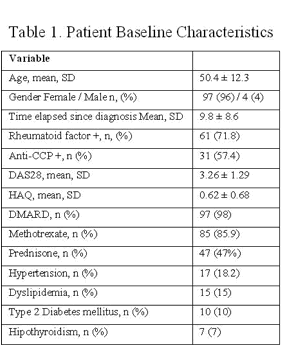Session Information
Title: Rheumatoid Arthritis - Clinical Aspects (ACR): Comorbidities, Treatment Outcomes and Mortality
Session Type: Abstract Submissions (ACR)
Background/Purpose .
Rheumatoid arthritis is an inflammatory systemic disease that leads to body composition alterations. Objective: The aim of our study was to identify the prevalence of sarcopenia, obesity and sarcopenic obesity in our population.
Methods .
We performed an observational, analytical study with 101 rheumatoid arthritis patients. Demographic, clinical and biochemical variables were recorded. Studies of body composition by dual X-ray absorciometry were performed. We took into account different definitions to determine body composition alterations (Table 1).
Results .
Ninety-seven (96%) patients were female, the rest of baseline characteristics are shown in Table 2. The mean age of our patients was 50.5 years (SD 12.3). The mean body mass index was 29.29 kg/m2 (5.4 SD). According to the World Health Organization classification of body mass index (BMI), 24 (23.8 %) patients had normal weight, 38 (37.6%) were overweight and 39 (38.6 %) some degree of obesity. According to the BMI adjusted for rheumatoid arthritis, 13 patients (12.9 %) were normal, 34 (33.7 %) overweight and 54 (53.5 %) obese. Ten patients had sarcopenia (9.9 %). Six patients (5.9 %) had sarcopenic obesity. Patients with obesity by dual X-ray absorciometry were 83 (82.2 %). Among clinical and para-clinical variables, the only significant association with sarcopenia was a higher score in the Health Assessment Questionnaire.
Conclusion .
The most prevalent body composition alteration in RA patients, were obesity. Sarcopenic obesity had a low prevalence, contrary to previous reports.
Disclosure:
N. Tello-Winniczuk,
None;
D. Vega-Morales,
None;
M. Garza-Elizondo,
None;
D. Galarza-Delgado,
None;
J. Esquivel-Valerio,
None;
O. Ilizaliturri-Guerra,
None;
J. Rodriguez-Olivo,
None.
« Back to 2014 ACR/ARHP Annual Meeting
ACR Meeting Abstracts - https://acrabstracts.org/abstract/low-prevalence-of-sarcopenic-obesity-in-rheumatoid-arthritis-patients-with-moderate-clinical-activity/


